SAM ALFAN.
Royal Media Services has suffered a major blow after losing a frequency battle which has been pending in court for the last eight years.
The Court of Appeal dismissed an appeal by RMS challenging a letter by the Communication Commission of Kenya (CCK) eight years ago, directing the broadcaster to stop interfering with frequencies allocated to other media houses.
“The upshot is that the appeal lacks merit and is hereby dismissed” the ruled.
Justices Wanjiru Karanja, Fatuma Sichale and Jamila Mohammed upheld a decision of High Court Judge David Majanja, saying CKK, the predecessor of Communication Authority (CA) was legally mandated to regulate airwaves.
The bench said CCK was acting within its mandate in investigating any complaints of interference with frequencies.
“From the record, we are satisfied that the 3rd respondent (CCK) followed the due process in enforcing the regulation of airwaves as mandated and that the impugned letters and notice were issued in accordance with Section 41 of the Kenya Information and Communication Act,” the Judges said.
RMS had challenged a letter written by CCK in 2012, which stated that several frequencies used by the media house were in contravention of the frequency assignment conditions.
The letter had also asked RMS to cease broadcasts on certain frequencies as they were interfering with frequencies assigned to other broadcasters.
The regulator then gave RMS 30 days to put in place corrective measures and install bandpass filters, obtain type approval for transmitters, shut down unauthorized stations and relocate to designated broadcast sites.
But the company argued that the letter lacked any basis because the regulator had inspected its radio and TV sites and broadcasting equipment in 2003 and had confirmed compliance.
S.K. Macharia accused CA of engaging in selective and discriminatory enforcement of the Act because some broadcasters were using transmitters not approved but the regulator took no action against them.
He claimed the move by CCK was threatening to infringe on its freedom guaranteed by the Constitution and usurping the powers it does not have by seeking to license and regulate airwaves yet no legislation has been made establishing an independent body to license and regulate broadcasting frequencies.
The judges dismissed the appeal saying CCK was legally mandated to regulate airwaves and licensing under the 1998 and 2009 Acts and that the promulgation of the Constitution did not render its actions immediately unconstitutional.
“Accordingly, we find that the CCK did not breach Article 34 of the Constitution in sending the impugned letters to the appellant and issuing the notice,” the Judges said.
The judges found that there was no material placed before the high court or before them to demonstrate that the appellant had instituted any contempt proceedings against the CA within media owners case.
“We find that the letters dated March 6,2012 , August 3,2012 and the notice published in the local daily on May 17,2012 were not in contempt of the conservatory orders issued in the media owners case and the judge did not error in finding that Communication Authority. was not in breach of the orders issued to media owners case” court added.
The judges found that there was no material placed before the high court or before them to demonstrate that the appellant had instituted any contempt proceedings against the 3 respondents within media owners case.
“We find that the letters dated March 6,2012 , August 3,2012 and the notice published in the local daily on May 17,2012 were not in contempt of the conservatory orders issued in the media owners case and the judge did not error in finding that 3 respondent was not in breach of the orders issued to media owners case.
The CA opposed RMS appeal through veteran lawyer Wambua Kilojzo saying that frequency spectrum is a scarce public resource allocated to nations in accordance with complex international agreements and CA was mandated to ensure utilization of the frequency spectrum in a coordinated manner to avoid interference of frequency users with each other.
Lawyer Wambua further told the appellate judges that frequency is not an owned asset or vested private property interest to be subjected to either mortgage, lien , pledge, attachment, seizure or similar property right by the RMS.
“Under Article 40(6) of the constitution, the right to property does not extend to any property found to have been unlawfully acquired” Wambua told the court.
He further submitted that CA gave appellant notice to remedy any breach and allowed the appellant to respond and address any issues through the letters dated March 6 ,2012 and August 3,2012 and dismissed the appellant claims that the judge erred in law and in fact finding that orders made in the media owners case were limited to the four corners of the said suit and matters in issue in that suit did not afford the appellant to operate without the law.







